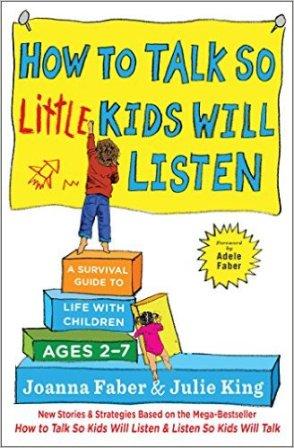Talking to teenagers is perhaps the most challenging task of parenthood. But there is hope that if you play your cards right, these kids will see the light. On the other hand, talking to 3 or 4-year-olds is a challenge that can stump even the best. In How to Talk So Little Kids Will Listen, the authors focus on 3 to 8 years age group and show you how you can stop your little one from screaming, running wild, or throwing things around and make a mess.
Joanna Faber is a parenting and education expert. She contributed heavily to her mother’s award-winning book, How to Talk So Kids Can Learn, and wrote a new afterword for the thirtieth anniversary edition of How to Talk So Kids Will Listen. She lectures and conducts workshops based on her mother’s work and her own experiences as a parent and educator.
Julie King has been educating and supporting parents since 1995. In addition to her work with individual parents and couples, she has led workshops for numerous schools, nonprofits, and parent groups.
How to Talk so Little Kids Will Listen: A Survival Guide to Life with Children Ages 2-7
Author: Joanna Faber, Julie King
Paperback: 432 pages
Publisher: Scribner; Reprint edition (January 10, 2017)
ISBN: 150113163X, 978-1501131639
How to Talk so Little Kids Will Listen Review
With the younger kids, it becomes increasingly difficult to understand the reasons for their behavior. Even if you reach them, it is unlikely that they would be able to articulate the reasons for their behavior. The author begins with addressing this problem head-on. She points to parents’ impatience and finding instant solutions to get them do what they must. But the trick lies in understanding the emotion involved when a kid refuses to do something.
She points out early on that kids are not necessarily very different form us and their irritant behavior lies in their physical or emotional pain. Just as we lash out when we are stresses, kids misbehave when they are not feeling well. The author plays various scenarios that show a how most parents and elders would try to convince the kids about what they are doing is wrong, and why most of those will fail. It is unfair to expect that a 4-year-old will understand your logical arguments based on morals, philosophy, or comparison.
You can always bribe the kid, but there is a danger that you will set a precedent for their entire life. The author’s answer is simple, do not challenge or deny what the kids a re feeling. Acknowledge their emotions first and suggest alternatives. How to Talk so Little Kids Will Listen gives enough examples in this way for you to fit to the most common situations.
But there are innumerable problems that yo have to handle and new one always crop up as the kids grow. After explaining this basic approach to handling upset kids, How to Talk so Little Kids Will Listen dives into the myriad problems. Each small chapter looks at how to handle a specific problem. Whether it is lying, using dirty words, or getting them ready for sleep, you will find a solution to some of the most pressing problems.
The latest edition adds to the original content and brings it up to date for the readers in 21st Century. Readers have found the book to be very helpful. They think it is not only helpful, but also fun to read as you will spot behaviors that you have faced many times and connect with the material in the book. With nearly 13,000 ratings on Goodreads, How to Talk so Little Kids Will Listen has nearly an all-star rating.
Interview with Joanna Faber about How to Talk so Little Kids Will Listen.
